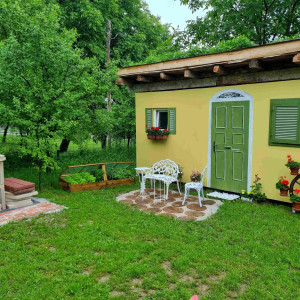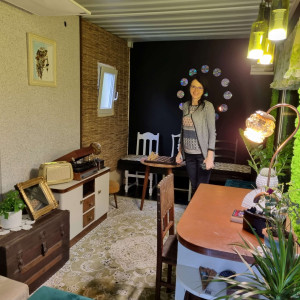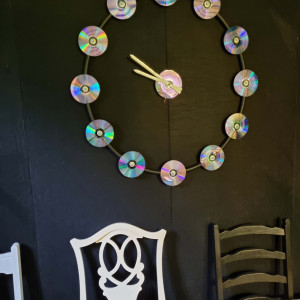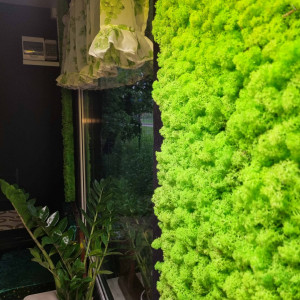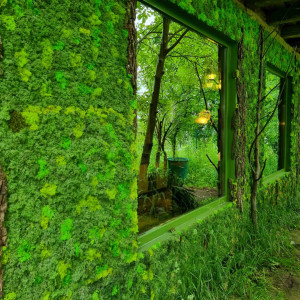

»Working together for a green, competitive and inclusive Europe«
PRESS RELEASE - WORLD ENVIRONMENT DAY, 5 JUNE 2023
Slovenske Konjice, 5 June 2023: Circular Economy Studio - studioKroG
On the occasion of World Environment Day, studioKroG's second-hand shipping containers showcased good practice in environmental conservation and sustainable development. In these extraordinary times, it has become clear that taking care of our planet is crucial, as we face many challenges that require immediate action. That is why, on World Environment Day, we are launching the Circular Economy Studio project to help create a more sustainable and responsible future. This year, World Environment Day focuses on "Renewable Energy for a Sustainable Future". The theme reflects the urgency of switching to renewable energy sources, which are key to reducing greenhouse gas emissions, conserving natural resources and moving towards a more sustainable future. World Environment Day 2023 promotes and highlights the importance of using renewable energy sources such as solar, wind, hydro, geothermal and other sources that are inexhaustible and have a lower environmental impact compared to fossil fuels, which is also presented in the Circular Economy Studio (Slovenske Konjice, CPU). On this day, the implementers of the StudioKroG project, supported by the Norwegian Financial Mechanism, presented the latest approaches that set new standards in sustainable architecture, design and construction according to the principles of the circular economy.
The Circular Economy Studio is an innovative concept based on the principles of the circular economy. The circular economy is an approach that aims to limit the consumption of natural resources, reduce waste, promote recycling and reuse materials. This approach is based on the idea that products, materials and resources can be used in endless cycles, thereby reducing the negative impact on the environment. The Circular Economy Studio project is designed to become a model of sustainable development and circular economy for other local communities. Through this project, we aim to create a comprehensive environmental and economic system that will promote waste reduction, reuse and recycling, and stimulate local employment and economic growth. The Circular Economy Studio project has created an innovative infrastructure that provides a better understanding of the circular economy and promotes local production and reuse of materials. Our aim is to achieve full resource recovery and minimise waste.
Dr. Klavdija Rižnar from the Scientific Research Centre Bistra Ptuj, the lead partner of the project, presented the project, its objectives and the changing paradigm in the context that the circular economy represents a shift from the traditional linear model (production, use, disposal) to a model that emphasises resource renewability and conservation of materials in a circle. It is important to understand that the circular economy requires a change in the way we think and act, and a rethinking of the entire life cycle of products.
Mag. Bojan Pirš, Director of OKP Rogaška Slatina, which is a partner in the project and actively participates in practice with four shipping containers in the OKP collection centre, where the CPU also operates. He stressed that as a public service provider, they play an important role in the overall system of circular resource management, especially in terms of the need to reduce waste and use resources efficiently. Indeed, a key principle of the circular economy is waste reduction and resource efficiency, which reduces the need for energy use. Rather than ending up as waste, materials need to be kept in the cycle of use and therefore their proper source separation and diversion into the use of material streams, as illustrated by the StudioKroG concept, needs to be established.
Polona Kukovec Lakota from the Ormož Development and Research Centre outlined the importance of education and awareness-raising in the field of circular resource use. Education and awareness-raising for both individuals and organisations is important for the successful implementation of the circular economy. The focus is on understanding the concept of circular economy, promoting sustainable lifestyles, raising awareness of the importance of waste reduction and resource efficiency.
Dr. Marinka Vovk from CPU, as investment partner of studioKroG, presented practical examples of circular resource use in two completely refurbished (second-hand) shipping containers that showcase reuse ("RE-USE"), "waste design" and industrial symbiosis, which in practice is manifested in the design of products made from waste. This is a convincing demonstration of the possibility of reuse, where only what already exists is used. The solar panels installed on the container, which visually is almost no longer there, are the first example of the reuse of this waste through a system of industrial symbiosis with Zeos d.o.o. Therefore, the contribution of the project is also in the field of renewable energies, which are key to reducing greenhouse gas emissions. It reveals the multiplicative use of refurbished shipping containers in design, allowing the creation of sustainable and attractive spaces without the use of virgin materials and the development of green jobs in Slovenia.
StudioKroG is a leading force in the transformation of containers into unique living units, offices, cafés, tourist info-points and other functional spaces for different target groups. Our commitment to sustainability and visionary approach includes the use of renewable materials, energy efficient solutions and the preservation of the natural environment, which is also the purpose of this year's World Environment Day for the whole planet.
Dr. Klavdija Rižnar, Project Manager, ZRS BISTRA PTUJ
Dr. Marinka Vovk, Investment Manager, CPU d.o.o.
Project Consortium:

|
The »Studio of Circular Economy« benefits from a EUR 776.975,00 EUR grant from Norway. |



